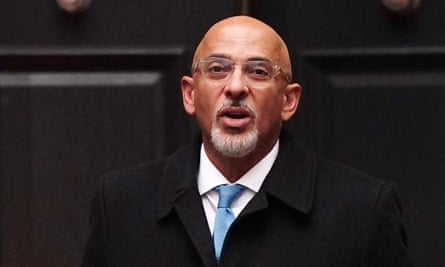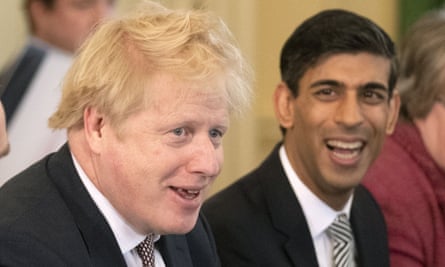In an otherwise depressed and anxious Tory party, there was one Conservative MP who appeared last Wednesday to be enjoying life at Westminster again. Liz Truss was back in parliament.
Several politicians, Labour and Conservative, who passed her in the corridors said how relaxed she appeared, with one colleague noting that she looked 10 years younger.
A Conservative MP who is leaving at the next election remarked that it was good that Truss seemed to have recovered some of her outward cheeriness after such a humiliating and disastrous 50-day stint as prime minister. “But I wish I could say the same about the rest of our party,” he added.
When he replaced Truss as prime minister last October, Rishi Sunak stood in Downing Street and admitted that his predecessor, while well intentioned, had made some serious mistakes. Soaring mortgage rates and government borrowing bore ample testimony to that. By contrast the new prime minister promised to lead a government of “integrity, professionalism and accountability at every level.”
Less than three months on, Sunak has found that manoeuvring the Tories on to a path of responsible government and down what his elections guru Isaac Levido says is now only a narrow “path to victory”, is not that simple.
It is not solely, or even primarily, the legacy of Truss that is proving problematic. Arguably more troublesome is the wash-up from the premiership of Boris Johnson. Not to mention the decade of Tory rule that preceded him.
Last week, Sunak’s chancellor, Jeremy Hunt, was trying to set out an optimistic economic vision for his party and the country as the cost of living crisis continues, to lift the spirits of both.

But it is hard to get upbeat economic policy messages heard above the noise over Tory sleaze and bullying allegations, and to make them sound credible in a country crippled by strikes, suffering the self-inflicted damage of a Tory-led Brexit, and heading into recession. “Everything we try to do now to chart a route to political recovery is obscured, drowned out,” said a Tory grandee.
In his short time at No 10 Sunak has already lost one cabinet minister – Gavin Williamson – as a result of bullying accusations. Currently two more are under official investigations which few think either will survive: Dominic Raab, the justice secretary and deputy prime minister, for bullying civil servants and Nadhim Zahawi, the party chairman and Johnson’s chancellor, over his tax affairs. Inquiries relating to Johnson mount up by the week and not only over Partygate. There are now two investigations into the appointment as BBC chairman of Richard Sharp amid allegations that he helped Johnson get a loan of £800,000 weeks before the then prime minister gave him the top job.
Early last week Sunak asked his new adviser on ministers’ interests, Sir Laurie Magnus, to look into Zahawi’s tax affairs. Some Tory MPs believe Zahawi should quit and many more that he should step aside at least temporarily pending the outcome of the Magnus investigation. The word in Westminster last week was that Sunak was worried about sacking Zahawi when he knew he might have to get rid of Raab days later. It would be better to kill two birds on the same day. If that was the case, one former minister observed, it was the “definition of weakness”.
At prime minister’s questions on Wednesday, Keir Starmer, the Labour leader, said the Zahawi affair showed how “hopelessly weak” Sunak was. Labour’s fear that Sunak might pose a threat to its chances of winning the next election by bringing calm and competence to the heart of government has so far proved unfounded. Instead the opposition can hardly believe its luck. “He cannot even deal with tax avoiders in his own cabinet,” Starmer said across the dispatch box before concluding with a final question. “Is he starting to wonder if this job is just too big for him?”

Sunak’s problems are not yet on the same epic scale as Truss’s were, but he too has enjoyed the reverse of a prime ministerial honeymoon. His and the Tories’ poll ratings rose a little for a very short period but now seem back on the slide, with younger voters abandoning the Conservatives in droves.
Despite the gloom on the Tory backbenches, the efforts to revive party and government fortunes continue. Most ministers who attended a special “away day” at Chequers on Thursday came away more optimistic, or so they claimed. No 10 briefed that it had been a great success. Levido had outlined a possible way ahead and seems to have offered hope that all was not completely lost. His main pitch was that relentless discipline, combined with what he claimed was a big but shallow Labour poll lead, still gives the Conservatives a shot at winning against the odds, as they did under John Major in 1992.
“It was a very good event, Isaac is a class act,” said one minister present. “The odds are stacked against us, but the Labour lead is soft and many voters are very undecided.”
Yet amid the warming wood-panelled splendour of Chequers, there were reminders of the battle Sunak is facing – not least from the presence of Zahawi, who some had assumed would not attend.
After a buffet lunch, the meeting included a political session at which Zahawi’s contribution was only fleeting – a sign that the chairman with supposed responsibility for election strategy was not able to fulfil the duties of his office.
On being given the job of chairman last October Zahawi described it as a great honour. He said he was looking forward to supporting Rishi Sunak. But the appointment is seriously damaging to a prime minister who promised a return to transparency and integrity.
Questions are now being asked about what Sunak was told and when. It was first reported last summer that HM Revenue & Customs was investigating Zahawi’s tax affairs – soon after Johnson had made him chancellor. The Observer also revealed that a “flag” had been raised by the Cabinet Office’s propriety and ethics team over his tax affairs before he was appointed chancellor.

The disclosure by the Guardian earlier this month that he paid a penalty as part of an estimated £5m tax settlement left the MP fighting for political survival. His troubles were compounded when Jim Harra, chief executive of HMRC, told MPs there are no penalties for “innocent” tax errors.
Allies of Sunak were saying last week that he was livid that neither Zahawi nor anyone else – including Simon Case, the cabinet secretary – told him about the tax settlement before he appointed him as party chairman last October, to be the chief salesman for the Conservative brand in the run-up to the next election. But several sources have told the Observer that Sunak was warned there could be a reputational risk to the government from Zahawi’s tax affairs when he appointed him.
One former cabinet minister said it was untenable to retain someone who had agreed a settlement and a penalty with the tax authorities while being chancellor. “He is toast,” he said. For many Tories, it is the sheer size of Zahawi’s tax settlement, as much as the penalty he paid to HMRC, that makes it unrealistic for him to stay in his post. There is a perception problem with voters, they say. “If this was an argument about £5,000, the reaction would be very different to one over £5m,” said one grandee.
While the cases of Zahawi and Raab are both hugely problematic for Sunak, another figure poses arguably a greater medium-term threat to his chances of making a success of his premiership. Both in the remaining baggage he has dumped on the party and the allure he still retains for some MPs, Johnson remains at the heart of Sunak’s travails. “Sunak has been very unlucky,” said a party veteran. “Both the Zahawi matter and the BBC matter are inherited dramas from the Boris Johnson years.” Another former cabinet minister until a few months ago said: “I have great admiration for Rishi. I think he is doing most things right, but he has a hellishly difficult job not least dealing with all the remaining Boris stuff.”

Last week while there was evidence that Johnson’s current priority is building his personal wealth – a £510,000 advance for a new memoir was revealed as well as huge sums earned for making a couple of speeches – his status among hardcore supporters as a great election winner means he remains a potential threat to Sunak.
MPs say Johnson is still flirting with a comeback. In an office drawer one Tory MP keeps a letter from Johnson, sent after the MP expressed support for him to return as leader following Truss’s implosion. The handwritten note from Johnson simply states it was “not the right time”, implying that that time might still come.
Friends of Johnson say he will attempt to jump ship to a safer seat before the next election. A likely berth could be Mid Bedfordshire, currently the seat of the passionate Johnson backer Nadine Dorries. Colleagues believe she has been promised a peerage by the former prime minister.
In the short term Johnson’s shadow will continue to loom large over his party, obscuring any attempt that may be made to repackage it as one of transparency and integrity. The most obvious is the forthcoming parliamentary inquiry into the lockdown parties and whether Johnson misled MPs, in which he will give public evidence. After that there will be a Johnson resignation honours list which, say his closest allies, could have as many as 100 names on it.
Johnson’s allies, meanwhile, are increasing their media profiles. Both Jacob Rees-Mogg and Dorries, his two most vocal ex-cabinet supporters, announced last week that they had taken up offers to host television shows. Rees-Mogg will appear on GB News, while Dorries will be on TalkTV. Her first big interview will be with a certain former prime minister.

On the right of the Tory party, meanwhile, some backbenchers are hankering after tax cuts despite the Treasury taking a hard line with striking public sector workers because, it says, there is not enough money.
The chancellor is facing competing calls from many within his own party to keep a tight rein on public spending to balance the government’s books, from others for tax cuts, and from business for more measures to stimulate optimism and encourage investment.
Business leaders reacted with dismay to Hunt’s speech last week that provided an upbeat message about the prospects for a return to growth later in the year, while at the same time ruling out tax cuts and subsidies to boost growth, despite both the EU and the US pushing ahead with huge investments in green technologies.
As if Sunak has not got enough problems to deal with, Truss has also let it be known that she wants to keep the flag flying for lower taxes to stimulate growth, and will speak out for that agenda before the March budget, despite Hunt having already said it will not contain tax cuts.
As one former cabinet minister put it: “I like Rishi and think he is doing the best be can. But it is a hellishly difficult, some might say, impossible job, he has taken on.”

 1 year ago
85
1 year ago
85










 English (US)
English (US)